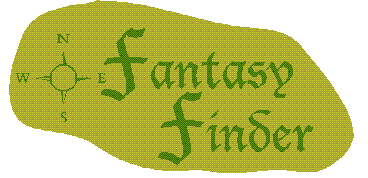
|

|
Paula Volsky
Illusion
Bantam 1992
Eliste vo Derivalle, a young and beautiful Exalted - noble - has been given the honor of becoming a Maid of Honor to the Queen. A truly exciting opportunity, leaving her rural Fabeque province for the pleasures and beaus of the Royal Court in Sherreen, capital of Vonahr. But things turn out quite differently from what she expected. Even before she left her home, there was uneasiness among the serfs, brutally repressed by her father, the Baron. And in Sherreen it's much worse, with revolutionary ideas circulating among proletarians and petit bourgeoisie. Among the Exalted at the Royal Court nobody notices these things, and Eliste is happily swept away from all boring thoughts about economy and politics by the delights of the Court. But one day they must face the popular opinion of their rule and their prerogatives. Brutally.
I hope most of you recognize the scenario. Yes, this is more or less a rip-off of the French Revolution, where the names have been changed. The king and queen - and the queen's evil adviser - are probably inspired by the last Russian Tsar and Tsarina and her repulsing adviser Rasputin, the Royal Court is located to a central part of the capital, and it's the castle, not a prison - like the Bastille - the mob invades when the revolution finally erupts. But all things considered, the story could just as well have taken place from 1789 to 1796 in Paris, France. With a little magic added, of course. It wouldn't have been stranger than in Orson Scott Card's Tales of Alvin Maker or Caroline Stevermer's A College of Magics. But it's fine with me to have it situated in a world of its own. It gives the author a little more freedom to change the facts to suit the story.
One thing that differs from real history is of course the magic. The reason why the Exalted have their privileges is their magic, which they used to protect the country in earlier wars. Now they seldom show their magic, and many don't believe they own it anymore, if they ever did. Eliste knows better, her hermit uncle Quinz being quite an adept. But how common is it? In herself she hasn't recognised any trace of it, and most of those she socialize with at the Court seem just as lacking. A comparison with European history gives a similar picture. The nobles had been given certain privileges because they were acting as the military force against foreign aggression, protecting the people, but at the time of the French revolution this function was long lost while the prerogatives remained. A hothouse for public dissatisfaction, as history has proved.
The economical forces behind the revolutions are quite the same, as are the political suppression and military repression. The development of the revolution is also quite similar, the initial destruction by the mob soon followed by a Terror regime, led by the demagogic Whiss v'Aleur and his Reparationist Party. v'Aleur is a Robespierre aided by magic to make his totalitarian regime even more horrible: magical machines control those who try to leave Sherreen, spy on those who stay and kill those who oppose the new state of affairs - and quite a lot of those who doesn't, too. But there is also a Shorvi Nirienne, whose ideas of liberty and democracy is seen as a more serious threat than the Royalists by the new dictator. He is more of a de Toqueville than a Danton, a true liberal who has no close equivalent in the French revolution but probably would've felt quite at ease in the American. Nirienne is probably the reason why this revolution doesn't end with a Napoleon.
The biggest difference between Vonahr and France is, however, the total lack of religion in Vonahr. In its place there is - nothing. Magic hasn't replaced it, there is no astrology or other semi-religious stuff like that. When people would've said "Oh, God!", Ms Volsky has changed it to "Oh, Gad!", proving that the lack of religion is completely intentional. But I really can't see any good reason to remove even the concept of a god, and French philosopher Voltaire would've found it totally unbelievable.
Something that hasn't been changed at all is love. Although politics and social issues take a prominent position in this novel, and there is plenty of action and adventure too, Ms Volsky has also included a love story. And quite a good one, at that. Emotionally strong, yet somehow realistic, and as pure as if Jane Austen had written it. Speaking of Jane Austen, I find Eliste's cousin Aurelie to be just like one of those thoughtlessly chattering young ladies who used to take Austen's ironic edge to its very peak. Ms Volsky is almost as good at it as the old master.
This is a great story, set in an interesting world - although quite similar to our own - but it's also a great piece of writing. Ms Volsky's rich language makes me think of Tad Williams. She really shows us how the variety of expressions available in the English language can be used - without getting too pretentious. It's not the best book I've ever read, but I recommend it to anyone interested in reading really good fantasy. To be interested in political and social history might not be necessary to enjoy it, but it certainly helps.
Karl Henriksson
| Paperback |  |
Books by the same author:
The Wolf of Winter
The Gates of Twilight
The White Tribunal
© Henriksson & Henriksson 1997.